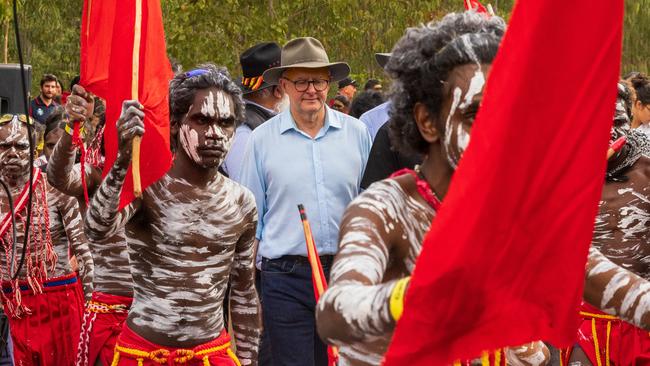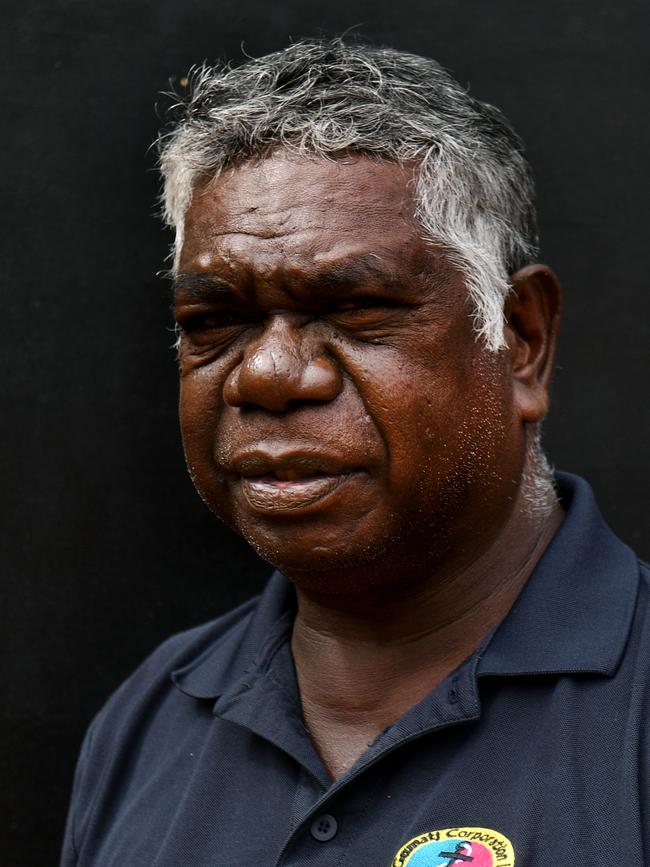Indigenous Voice to Parliament referendum question revealed
The Prime Minister has revealed what question Australians will have to answer in the Indigenous Voice in the constitution referendum. HAVE YOUR SAY
Indigenous Affairs
Don't miss out on the headlines from Indigenous Affairs. Followed categories will be added to My News.
A REFERENDUM on the Uluru Statement of the heart has inspired hope, yet the Elders of Garma say they are all too familiar with promises from the mouths of politicians.
Their comments came as Anthony Albanese formally announced he would set a referendum date to allow Australians to choose whether to enshrine an Indigenous voice to parliament.
Australians will be asked if they “support an alteration to the Constitution that establishes an Aboriginal and Torres Strait Islander Voice”.
Mr Albanese said the referendum question, which did not elaborate the structure of the voice or how it would operate, was critical for the referendum to open up an empathetic and meaningful debate.
Since Federation there have been 44 proposals for constitutional change put to Australian electors. Only eight of these have been approved.
“We recognise the risk of failure. But we also recognise the risk of failing to try,” Mr Albanese said.
The Prime Minister reaffirmed his commitment to implement the Uluru Statement in full after he was welcomed with a round of applause and a standing ovation from the Garma audience on Saturday.
“For me, it was an honour to be a witness to a dance, song and story and tradition tracing back some 60,000 years,” he said.
“As a breeze came across me, your ancestors’ presence in these lands and waters makes real your 60,000 years and more of custodianship of this land.
“I believe there is room in Australian hearts for the Statement of the Heart.
He said it was “nothing more and nothing less” than allowing Indigenous people to make decisions on policies that impact their communities.
“It’s not about special treatment or preferential power,” he said.
“Not a third chamber, not a rolling veto, not a blank cheque, but a body with the power and the platform to tell the government and the parliament the truth about what is working and what is not.
“This is simple courtesy, it is common decency.
“Along with common courtesy, is common sense — respect works.
“When we trust in the values of self determination and empowerment, then the policies and programs are always more effective.”
Mr Albanese said the Voice would exist and endure outside the “ups and downs of election cycles and the weakness of short-term politics”.
“It will be an unflinching source of advice and accountability,” he said.
“To tell the truth with clarity and conviction.”

Youth Yindi Foundation board of directors member Djawa Yunupingu said promises to Indigenous people had been treated as binding as words written on the red sands of the Miwatji (sunrise country of northeast Arnhem).
“Over time there have been many promises made to my people,” Mr Yunupingu said.
“Only to see these promises betrayed.
“Big talk, no action, no delivery.”
Many things have been promised at Garma and never delivered.
Mr Yunupingu said the history of the two worlds – Indigenous and ngapaki – was one littered with empty promises.
Yet he said the commitments to the Uluru Statement from newly-elected Anthony Albanese were “lifting our spirits”.
Mr Yunupingu said the new Prime Minister appeared to understand the “seriousness of the business”.
“‘Nhana Nathilyarra’: look to the future: These are meaningful words to our fathers,” he said.
“We can find that pathway to unity in this southern land under our Southern Cross.”
As the saltwater air rustled through the leaves, Mr Yunupingu reminded the Garma Festival attendees to acknowledge the power of the land where they stood
“This place is special and sacred to my people. it’s a place where we can make partnership and engage in serious business,” Mr Yunupingu said.
“We can send rockets to space, we can write laws of the land, and we can make plans for the future.

Mr Yunupingu said the gurtha – a sacred fire – burned within the Yolngu people.
He said this spirit was one that could burn across Australia calling for reform.
“Our gurtha – the sacred fire – burns not just for us, but for everyone,” he said.
He said to forge the Uluru Statement “we took the fire to the rock”.
He welcomed the voices of the Dilak – men and women and knowledge and leadership – at Garma and encouraged all to listen to their calls for reform.
“Because we are here under the guidance, not of my brother and my family, but of all Aboriginal people who are part of us,” Mr Yunupingu said.
“We are all in this together.
“These ancestors are at the heart of what Australia really means.”
Anindilyakwa Land Council chairman Tony Wurramarrba said calls for Treaty, local decision making and other reforms would not die away if the Uluru Statement was accepted.
“The referendum, all the voice, doesn’t mean nothing to me. What matters is, for my people, is decision making by us,” Mr Wurramarrba said.
“For so long, promises were broken promises.”
“That is the only way things will work for us out in the communities.
“We must unite for one goal here and that is to take control. Take control of our livers. If we don’t take over our lives, we are nothing.
“We are not reinventing the wheel here, we are setting the wheel in motion again to what it was before.”
Northern Land Council chairman Sam Bush-Blanasi similarly called for greater local decision making to hand power back to Indigenous people.
“But I don’t hold my breath, I keep breathing. Because if you hold your breath and wait for it you will die,” Mr Bush-Blanasi said.
“We talk too much and there’s not enough action.”
Opposition Indigenous Australians spokesman Julian Leeser raised concerns over the lack of clarity in the referendum question.
“The way to get all Australians behind this is to be really upfront on this,” Mr Lesser said.
He said the public’s “legitimate concerns” had been left unanswered, including who would serve, how it would be formed, how it would operate.
Mr Lesser and said he would work with the Government and push for further detail.
The Greens have also flagged discussions with the government following the referendum announcement.
DjabWurrung Senator Lidia Thorpe said critical recommendations about Treaty, deaths in custody, and the stolen generation needed to be addressed outside the Voice referendum.
“Labor has an opportunity to show us that they’re committed to action, not just symbolism,” Ms Thorpe said.
“These are things that will save people’s lives, before any referendum.
We don’t have to wait until next year to have our rights legislated. Labor can support the United Nations Declaration on the Rights of Indigenous People, which is being debated in Parliament on Monday.”
Read related topics:Voice to Parliament




